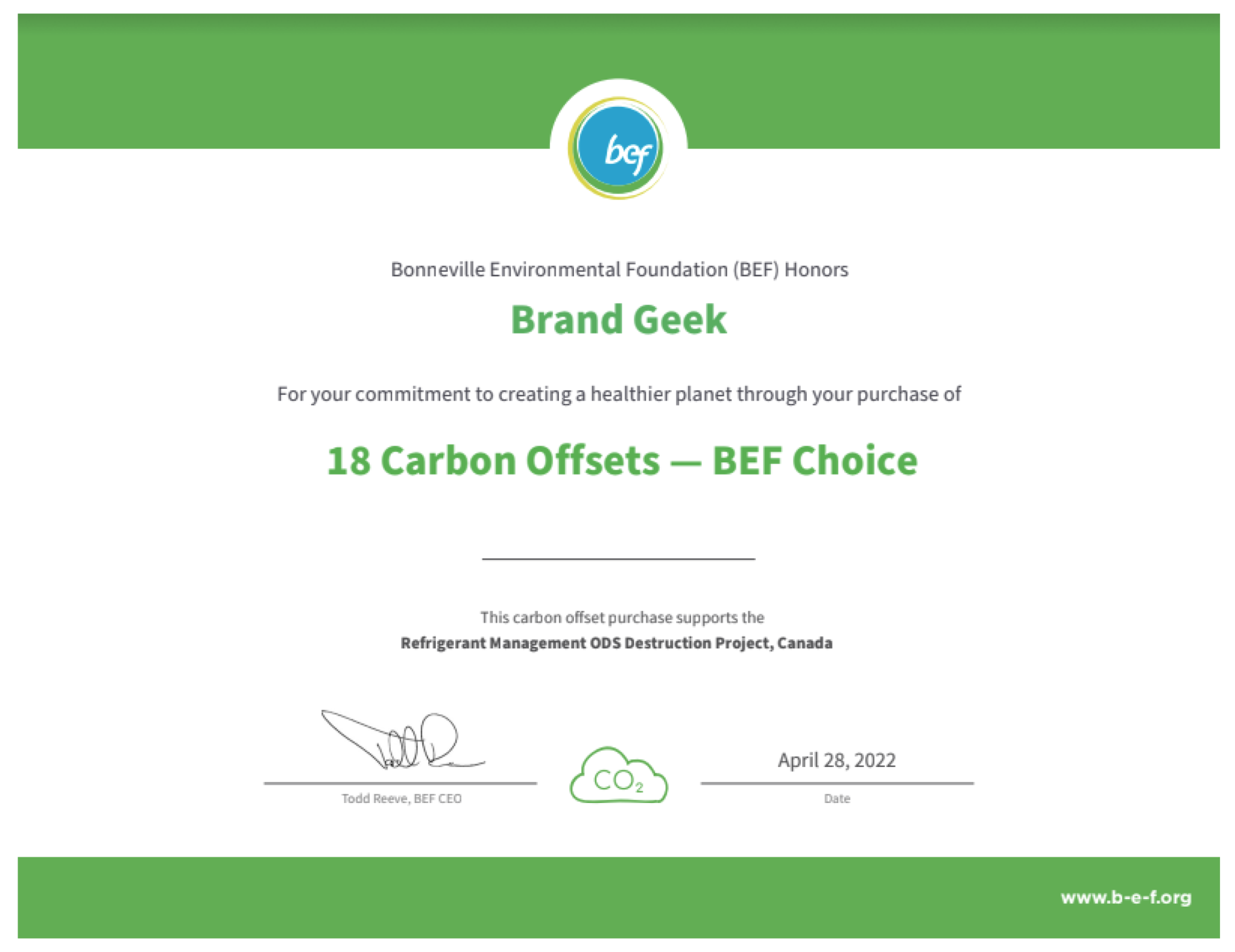Brandgeek proudly supports Mountain Area Preservation and is humbled to be…
Geekview IP Weeks(ish) in Review
USPTO’s favorite child continues to get star treatment.
I first wrote about Blue Ivy Carter in Geekview on January 29, 2012. That was a mere three days after Beyonce’s licensing company, BGK Trademark Holdings, LLC (BGK) filed a trademark registration application with the USPTO to register BLUE IVY CARTER for goods in 15(!) International Classes, though too soon for the application to appear in the TESS database. A few days later the application appeared and was magically examined in less than three weeks (it usually takes 3 months). The PTO says this is because similar applications are examined together, but the first application for BLUE IVY CARTER was for BLUE IVY CARTER NYC, filed by Joseph Mbeh on January 11, 2012 and examined on January 25, 2012, so what explains the record speed of that first one except the fame of the parents? And under what legal theory can Frito-Lay possibly claim that it’s OK to market genetically modified food as “natural” . . .
Frito-Lay sued for being greasy.
Did you know Fritos brand corn chips make fantastic fire starters? Try it only under competent adult supervision or just trust me. Fritos flammability will save you in the wilderness, but it’s not gonna save Frito-Lay from claims of false advertising, unfair competition, violation of the CLRA, breach of express warranty & violation of CA’s Magnuson-Moss Act for marketing certain flavors of SunChips and Tostitos as “Naturally Delicious.” Also under fire is Frito-Lay’s marketing and labeling of these products as “made with ALL NATURAL ingredients.” According to the (class action, of course) lawsuit filed in December and still hitting headlines in February, the products that are subject to the lawsuit are primarily made of corn and vegetable oil, which are the first two ingredients on the product labels. Both these ingredients are made from genetically modified plants and organisms (GMO’s), which are very clearly not naturally occurring. The World Health Organization’s GMO FAQ defines GMO’s as “organisms in which the genetic material (DNA) has been altered in a way that does not occur naturally.” Since natural and GMO are antonyms, it sure seems unfair to allow Frito-Lay to market GMO food as natural. It’s not only unfair, it’s also unwise to infringe on biker’s marks . . .
Bikers & Bikinis bid the court farewell.
Bikers are fast. Sometimes news is slow. On February 1, 2012 the Austin Business Journal reported that “[t]he Republic of Texas Biker Rally Inc. and Bikinis Bar & Grill (yup, it’s exactly what you think it is) have reached a settlement in a trademark infringement lawsuit.” This is true, only it happened in July, 2011 when the court entered an order on a consent judgment and permanent injunction. In other words, once the parties settled their case, they had the court enter an order reflecting certain aspects of their agreement, which the court has the power to enforce if necessary without a whole separate lawsuit for breach of contract. In the consent judgment, Bikinis agreed not to sell any goods displaying the Republic’s marks and/or claim that it is a licensee of the Republic without a licensing authorizing such behavior. Although not addressed in the lawsuit with the bikers, Bikinis also seems to be misusing the trademark registration symbol, since the BIKINIS mark is not federally registered in the U.S. (nor do I believe it to be registerable given its descriptiveness) and yet I’m certain I see a registration symbol in connection with the mark as used on Bikinis’ website. Perhaps Batman can help . . .
DC Comics not ready to throw in the towel.
Holy Smokes Batman! The Gotham Garage stole the Batmobile (design). Never fear; its DC Comics to the rescue! DC Comics filed a lawsuit against Mark Towle and his Gotham Garage for copyright infringement, trademark infringement, unfair competition and dilution to stop them from manufacturing, distributing, offering for sale and selling reproduction automobiles bearing the DC Comics trademarks and bearing and/or depicting copyrighted properties of DC Comics (specifically, the Batmobile). DC Comics filed an amended complaint on November 22, 2011 and Towle moved to dismiss the copyright infringement claim on December 16, 2011. DC Comics Opposed the Motion to Dismiss on January 4, 2012 and Towle Replied to the Opposition to the Motion to Dismiss on January 11, 2012. The Court issued its Order denying Towle’s Motion to Dismiss on January 26, 2012, about which Wired ran a story in early February. DC is likely to call on its superpowers to fight for the protection of its intellectual property. Litigation can be a long road to settlement, though most cases do settle eventually. And most worldwide performing artists have their copyrights infringed eventually . . .
John Butler wonders is that my zebra in your ad?
John Butler and his Trio (who perform worldwide as the John Butler Trio (JBT)) must have felt like someone head-butted them after hearing the guitar riff from their hit song Zebra (riff starts at 49 seconds) in an Oikos yogurt Super Bowl ad. Fans like myself will notice the similarity instantly and many did, according to a February 5, 2012 post about the issue on JBT’s Facebook page, on which 358 people commented. On February 8, 2012 The Telegraph reported that Oikos’ parent company, Dannon apologized to JBT, stating that a Dannon spokesman apologized to the band and its fans but said it was still investigating the alleged infringement. Meanwhile, the infringement has continued unabated, with the Super Bowl ad front and center on Oikos’ webpage. While it is possible that the riff used by Oikos was created independently (without access to JBT’s Zebra), I somehow doubt it. If Dannon doesn’t pony up some cash, I imagine this will play out in federal court. Meanwhile, a (class action, of course) false advertising lawsuit has begun to play out against Hall of Fame slugger George Brett . . .
George Brett finds ionic necklaces to be a real pain in the neck.
George Brett is learning the hard way that swinging a baseball bat is easier than swinging bracelets. For an Iowan named Seth Thompson filed a (you guessed it, class action) lawsuit against Brett’s company, Brett Bros Sports Int’l, for unfair competition and unjust enrichment stemming from its sale of ionic gear. The suit alleges that the Brett Bros ionic gear, “promises to rejuvenate your body from physical activity and stress. The IONIC necklace helps relieves stiffness in the neck and shoulders, eventually stabilizing your whole body. The IONIC molecules inside the necklace will help rejuvenate your body from the strain of physical activity and stress.” Plaintiff Thomson bought a necklace, wore it, and still felt stressed out, so he sued. Perhaps no one told him how stressful litigation can be, even for a plaintiff whose attorneys are working for a contingency fee. Perhaps some herbal tea would have been better for Mr. Thompson. Or maybe he’ll sue his lawyers for intentional infliction of emotional distress once the class action lawsuit is over. And to be honest, it wouldn’t surprise me one bit in a world where whales are suing for civil rights violations and pit bills are pissed about being dissed by McDonald’s . . .
McDonald’s attacked by pit bulls.
McDonald’s new McBites ad sure bit it in the butt! On February 3, 2012 McDonald’s ran a radio ad on 99.7 The Point in Kansas City, Kansas that claimed trying its new McBites was less dangerous than petting a stray pit bull. Midwesterners love their pit bulls and the hounding of McDonald’s started soon thereafter. The very same day the ad aired, Pit Bulls Against McDonald’s launched a Facebook page, which as of this writing has 12,981 fans and 15,017 people (including me) talking about it. On February 5, 2012, BADRAP posted a YouTube video showing an assortment of pit bull lovers’ responses to the McDonald’s ad. According to the SaveaBull.com McDonald’s since apologized but that hasn’t quelled the bark or the bite of those who feel scorned by McD’s.
 We increasingly see how fast word travels on the internet and how expensive false advertising can be, especially in the natural and organic products space. This sustainable feeding ground for class action lawyers is bound to grow even bigger when the FTC finally issues its new Green Guides later this year (learn more here and here).
We increasingly see how fast word travels on the internet and how expensive false advertising can be, especially in the natural and organic products space. This sustainable feeding ground for class action lawyers is bound to grow even bigger when the FTC finally issues its new Green Guides later this year (learn more here and here).










This Post Has 0 Comments